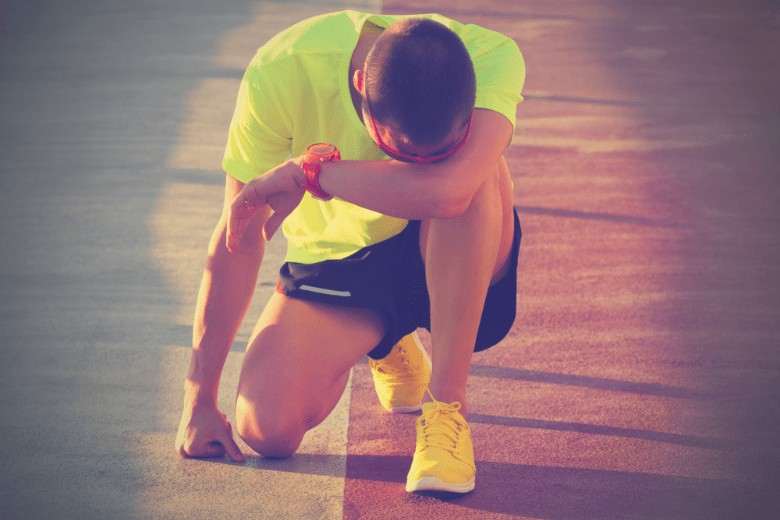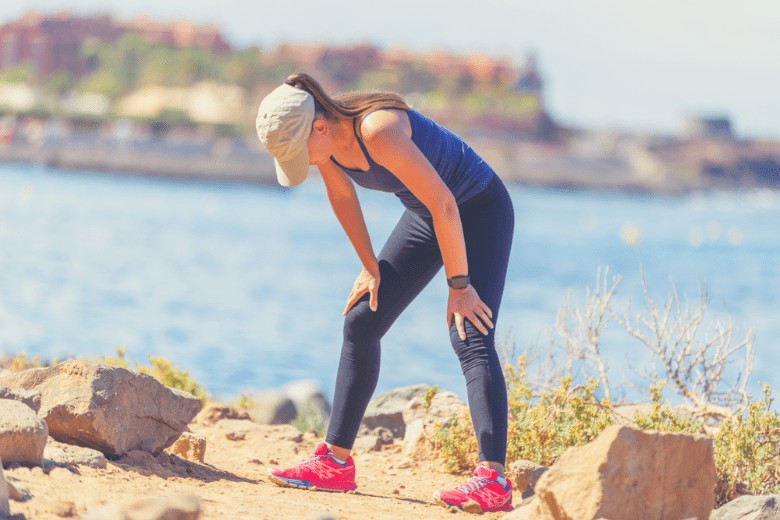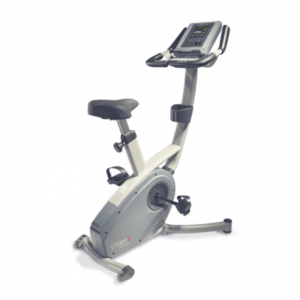The Bottom Line:
- “Bonking” occurs when you fully deplete your body’s glycogen stores during exercise.
- “Bonking” is common among endurance training or high intensity exercise
- It is important you have enough fuel to maintain performance
- Carbohydrate supplements or glucose tablets can help provide the necessary fuel quickly
When I first became serious about fitness and running, I didn’t really know much about the terminology.
I knew what most of the machines were called, and I knew the basic stuff like carbs, macros, counting calories, gains and 5Ks.
When I first heard the term ‘bonking’ used, though, I was lost. As far as I knew, that was what the three stooges did to each other’s heads.
What Is Bonking?
In scientific terms, bonking is a form of sudden onset hypoglycemia (although, less often, it can also be a form of hyponatremia – see the note at the end of this section).
Put simply, it’s that inevitable time mid-workout or mid-run when your body just kind of stops.
We’ve all experienced it, whether we were at the gym or in the middle of a marathon.
We’re moving right along, keeping up our momentum and feeling great when suddenly, it hits us out of nowhere.
Our bodies say, “Enough! I’m done!” Your muscles get weak; you feel exhausted, and your brain sends a message to the rest of your body to stop whatever it’s doing and slip into preservation mode.
Some people used to use the terms ‘bonking’ and ‘hitting the wall’ interchangeably, but a true bonk (so-called because cyclists claimed the feeling was like getting bonked in the head and put completely out of commission) is more than just hitting the wall.
Hitting the wall is when your body loses too much glycogen and starts feeling really bad. A true bonk, though, is the complete and total depletion of glycogen from both the liver and the muscles.
As a result, it’s effects are much more intense and much more dangerous.
*Note: The term ‘bonk’ can also refer to a total loss of sodium in the blood, but this is much more rare and less likely to happen than the more common loss of glycogen – glucose – in the blood.
What Are the Symptoms of a Bonk?
There are several different symptoms you may feel if you bonk in the middle of your run, bike ride or exercise routine.
The most common ones are fatigue, bone-deep weariness and exhaustion. However, depending on the severity of your bonk, your symptoms could be even worse.
Some people report feeling dizzy and dehydrated. Their muscles cramp and ache, and they start to have digestive problems and pains.
Some people even begin to hallucinate.
If your goal is to prevent a bonk, though, you’ll need to be looking for signs of its coming as opposed to symptoms of it already happening.
These signs include:
- Irregular or rapid heartbeat.
- Tongue, cheeks or lip numbness or tingling.
- Shakiness.
- Clamminess.
- Anxiety.
- Hunger.
- Loss of color in the cheeks.
- Irritability.

Why It’s So Bad
In addition to the painful, embarrassing and all-around unpleasant symptoms of bonking, there are other consequences that are bad for different reasons.
Negative Consequences to Your Immune System
There are several studies that link glycogen molecules to the immune system, which means a total depletion of glycogen – especially if it happens regularly or often – could have some seriously damaging effects on the body’s ability to fight disease and infections.
Loss of Muscle Mass
Glycogen is stored in two places, the liver and the muscles, and the first place glycogen comes from during energy production is the liver.
After its glycogen stores have been depleted, the body then pulls glycogen from the muscles.
Once all the glycogen has been pulled from the muscles, the body has nowhere else to go for glycogen.
This total depletion of glycogen is the cause of the bonk.
However, if you keep pushing through the bonk, your body will keep trying to pull glycogen from the muscles, which can reduce your muscle mass.
Think of it as your body literally eating your muscles to try to find the glycogen inside them.
If you’re exercising in an effort to increase muscle mass and tone your body, a bonk can actually have the exact opposite effect.
It’s Just Not Healthy
Finally, it just isn’t healthy to bonk too often.
Because of the negative side effects – dehydration, muscle pains, dizziness, possible hallucinations, etc. – you can get seriously hurt from a bonk.
You could lose your balance and fall; you could send your body into catastrophic dehydration, and the implicit dangers of hallucinating are numerous indeed.
Furthermore, human beings are designed to avoid pain. We know the stove is hot, so we don’t touch it.
We know knives are sharp, so we use them carefully so as not to cut ourselves.
If you bonk too often and feel too much physical and emotional discomfort, it’s very likely to cause you to give up your workouts altogether just to avoid feeling that discomfort again.
What Is Glycogen Anyway?
Glycogen molecules are formed when you consume more carbohydrates than your body needs for immediate energy production.
They’re stored in your liver and muscles, and your body pulls the excess glycogen into your bloodstream to regulate your insulin and glucose levels (and give you energy) when you’re doing something physical.
Why Does the Body Need Glycogen?
Glycogen helps regulate the glucose and insulin levels in a person’s blood. The more active you are, the more glycogen your body needs to help regulate your levels.
Glycogen is also a huge source of energy.
Therefore, the more energy you’re using, the more energy your body must supply. If you’re doing something extremely physical, such as weightlifting, running, biking or any form of hardcore cardio, your body will quickly deplete your glycogen stores.
This process is known as glycogen depletion. A bonk occurs when literally every bit of stored glycogen in your body has been used.
Is There a Way to Avoid Bonking?
If you want to avoid suffering a bonk during your exercise routine, you have to ensure you have plenty of carbs in your body that can produce glycogen.
There are several different ways to accomplish this.
Eat Small But Often
The amount of carbs you’ll need in your body is going to be much higher if you’re about to head into something physical and strenuous.
On a normal day at work or sitting at home, you might be able to go most of the day without consuming more than a dozen grams of carbs and be just fine.
However, on days when you’re planning a high-intensity workout or are going to run or bike in a competition, your body could need upwards of 100 grams of carbohydrates every hour!
One way to consume this large amount of carbs is by eating small, high-carbohydrate foods before, during and after your exercise routines.
This is easier to do than you think.
When people think of carbs, they often think of rice, pasta, potatoes and other starchy foods that aren’t easy to carry around and eat on the go, but there are actually plenty of foods that are high in carbs and easy to transport.
You can keep dried fruit on-hand for a quick, carby snack.
Most fruits are very high in carbs, so whether you keep packs of dried fruits in your bag or fresh apples, berries, bananas and other fruits in a cooler, they’re all good sources of before, during and after carbs.
There are also plenty of high-carb energy bars that are easy to carry with you while running, biking or working at the gym. Yogurt and breads (toast, bagels, etc.) are also good options.
Change Your Diet
Don’t be afraid to make changes to your overall diet as well.
If you’re going to be working out regularly – four or more times a week – then you’re going to need to adjust your total carbohydrate consumption, not just your carb consumption right around workout times.
Cook meals high in carbs and protein for a balanced source of energy. Lean meats and starches are great.
Some kind of pasta salad that includes low-fat meats is another great option.

For Specific Events, Start a Week Ahead
If you’re trying to avoid bonking during a special event like a marathon or a bike-a-thon, you’ll want to adjust your diet about a week ahead of time.
You really want to go carb crazy during the week before your race. Runner’s World suggests that you start “carbing up” at least five days ahead of a big race.
Two days before the race, RW suggests you consume “3.6 to 5.5 grams [of carbs] per pound of body weight.”
That can add up to a lot of carbs, but it can also help ensure that you don’t bonk out right in the middle of your big run as well.
Carbohydrate Powder
One quick and easy way to digest carbs frequently is by using carbohydrate powder, which is very similar to protein powder.
It’s simply powdered carbohydrates that you mix in with water.
Because carb powder is easily digestible and quickly absorbed, you can drink your carb powder drink on the way to the gym and have plenty of glycogen ready to go by the time you get there.
Some carb powders are designed to be consumed pre-workout.
Others are meant to be used during or after workouts as a way of recovering and replenishing your depleted glycogen stores.
Just be aware that with these powders, you’re getting a huge dose of concentrated carbs, so if you have diabetes or other insulin or blood sugar issues, you may want to check with a doctor before using carbohydrate powder.
Glucose Tablets
While I don’t recommend you try supplementing your carbohydrates intake with glucose tablets alone or even regularly, they’re nice to have on-hand in case of a glycogen depletion emergency.
You can find them at almost any drug store or the pharmacy section of any mass merchandise retailer.
They’re normally used by diabetics to help combat a sudden drop in blood sugar – which is exactly what happens when you bonk.
Although your athletic- or exercise-related bonk might have nothing to do with diabetes, the results are exactly the same.
As a result, glucose tablets can help combat your bonk just as it helps combat their hypoglycemia.
If you start noticing signs of low blood sugar (glycogen depletion), take three or four tablets. You should notice a fairly quick change.
Summing It Up
Whether you’re a runner, a biker or just someone who loves high-intensity exercise, chances are you have probably experienced the bonk at one time or another.
If not, you’re lucky, and it’s not something you ever want to experience.
The only way not to bonk, though, is to ensure you never fully deplete your body’s glycogen stores, and the only way to do that is to ensure you’re consuming enough carbs regularly and during those specific times before, during and after your workouts, runs or biking trips.
There are plenty of ways to do this. You can make long-lasting, permanent changes to your overall diet to help ensure you keep a constant supply of carbs in your body at all times.
When planning for certain events, start eating carb-heavy meals a week or so before the event start date.
You can also make sure you always have enough high-carb snacks on-hand in case you feel yourself getting hungry or starting to feel drained.
Carbohydrate powder and glucose tablets are also suitable supplements if you need to induce a quick shot of glycogen into your body to stave off complete glycogen depletion.
However you choose to do it, the important thing is to always have enough carbs in your body to avoid bonking, and don’t get discouraged.
It may take a few attempts before you find the right combination of meals, snacks and supplements that works best for you. Just keep trying different things until you get it right.
Need quick fuel without the calories? We recommend this carbohydrate supplement.



